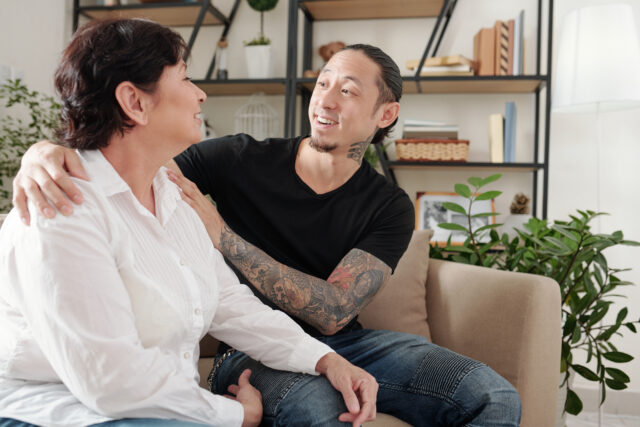Ways To Successfully Excuse Other People’s Bad Behaviour
 Envato Elements
Envato Elements When someone does something that offends or upsets us, it’s easy to write them off entirely — but that might be unfair.

Even good people do bad things, and if you really know and like someone, you won’t want to cut them off for one or two transgressions. So, how do you get over their behaviour without holding it against them? Here are some tips to make it a bit easier.
1. Consider their intentions.

Before jumping to conclusions, take a moment to consider the person’s intentions. Did they mean to hurt or offend you, or was their behaviour unintentional? Sometimes, people act out of stress, frustration, or ignorance, and their intentions might be good even if their actions weren’t. By considering their intentions, you can gain a deeper understanding of the situation and choose a more compassionate response.
2. Look for underlying causes.

Bad behaviour often stems from underlying issues. Perhaps the person is going through a difficult time, dealing with personal struggles, or simply having a bad day. By understanding the root cause of their behaviour, you can approach the situation with empathy and compassion. This doesn’t mean excusing their actions entirely, but it can help you navigate the situation with a more nuanced perspective.
3. Give them the benefit of the doubt.

Everyone makes mistakes, and it’s important to give people the benefit of the doubt, especially those we care about. Assume positive intent and give them the opportunity to explain their behaviour. It’s possible they didn’t realise how their actions affected you, or they might be genuinely remorseful. By approaching the situation with an open mind, you open the door to understanding and reconciliation.
4. Communicate your feelings and concerns.

While excusing someone’s behaviour can be an act of compassion, it’s also important to communicate how their actions affected you. Express your feelings and concerns in a calm and respectful manner. This can help the person understand the impact of their behaviour and create an opportunity for them to learn and grow. Remember, communication is key to any healthy relationship.
5. Set boundaries and expectations.

Excusing someone’s behaviour doesn’t mean giving them a free pass to continue hurting you. It’s important to set clear boundaries and communicate your expectations for future interactions. Let them know what you’re willing to tolerate and what you’re not. By establishing healthy boundaries, you protect yourself from further harm and create a more respectful and supportive relationship dynamic.
6. Focus on the positive aspects of the relationship.

No one is perfect, and everyone has their flaws. When excusing someone’s bad behaviour, try to focus on the positive aspects of your relationship. Remember the good times you’ve shared, the qualities you admire in them, and the reasons why you value their presence in your life. This can help you maintain a balanced perspective and avoid dwelling on the negative.
7. Practice forgiveness.

Forgiveness is a powerful act that can liberate both you and the person who wronged you. It doesn’t mean forgetting or condoning their behaviour; it means releasing yourself from the burden of anger and resentment. Forgiveness allows you to move forward and heal, both individually and as a relationship. It’s a choice you make for your own well-being, not for the other person.
8. Don’t hold grudges.

Holding on to grudges is like carrying a heavy backpack filled with rocks. It weighs you down and prevents you from moving forward. When you excuse someone’s bad behaviour, make a conscious decision to let go of the anger and resentment. This doesn’t mean you have to forget what happened, but it means choosing not to let it control your thoughts and emotions.
9. Choose your battles wisely.

Not every instance of bad behaviour warrants a confrontation. Sometimes, it’s okay to let minor annoyances slide, especially if they’re not a recurring pattern. Pick your battles wisely and focus on addressing the issues that truly matter to you and the relationship. By choosing your battles, you avoid unnecessary conflict and preserve your energy for the things that truly matter.
10. Don’t enable harmful behaviour.
 Source: Unsplash
Source: Unsplash While excusing someone’s behaviour can be an act of compassion, it’s important to distinguish between excusable mistakes and harmful patterns of behaviour. If someone repeatedly hurts you, disrespects your boundaries, or engages in toxic behaviour, excusing them can enable their harmful actions and perpetuate the cycle of negativity. In such cases, it might be necessary to distance yourself from the person or seek professional help.
11. Remember that excusing doesn’t mean forgetting.
 Source: Unsplash
Source: Unsplash While forgiveness is about letting go of anger and resentment, it doesn’t mean forgetting what happened. It’s okay to remember the hurt and the lessons learned. In fact, it’s important to remember so you can protect yourself from future harm and make informed decisions about your relationships. By remembering, you can learn and grow from your experiences.
12. Focus on your own well-being.
 Source: Unsplash
Source: Unsplash Ultimately, excusing someone’s bad behaviour is a personal choice. It’s important to put yourself first and make decisions that align with your values and needs. If excusing someone’s behaviour feels empowering and helps you move forward, then it’s a valid choice. However, if it leaves you feeling resentful or violated, it might be time to reconsider your approach.
13. Know when to walk away.
 Source: Unsplash
Source: Unsplash Sometimes, despite your best efforts, excusing someone’s behaviour isn’t enough to heal the relationship. If the person continues to hurt you, disrespect your boundaries, or refuse to take responsibility for their actions, it might be time to walk away. It’s a difficult decision, but sometimes it’s the healthiest choice for your own well-being. Remember, you deserve to be in relationships where you feel valued, respected, and safe.





